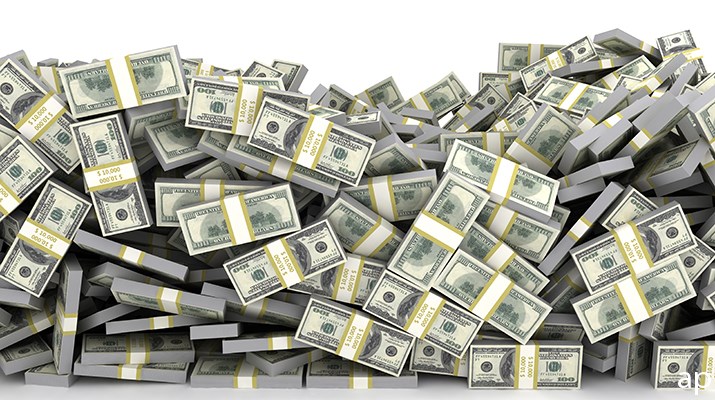
Editor's note: Read the latest on how the coronavirus is rattling the markets and what you can do to navigate it.
While the COVID-19 pandemic triggered severe volatility in equity and fixed income markets in March and into April, Steve Locke and his fixed income team at Toronto-based Mackenzie Investments were able to take advantage of opportunities and effectively boost the running yield for the 5-star rated $2 billion Mackenzie Strategic Income D, a fund that is designed to generate income from a 50-50 blend of fixed income and equities. The running yield was raised to 4%, before fees, from 3.5%.
“The COVID environment included a very quick sell-off in equities and areas of credit risk, including high-yield bonds and bank loans, and investment-grade corporate bonds, in the first half of March, followed by a very sharp rebound in many markets in the second half of March and into April,” recalls Locke, a 26-year industry veteran and senior-president, portfolio manager and head of the fixed income team. Locke’s 21-person team manages about $45 billion in fixed-income assets. “When you look across that dip in the market, yields have not changed very much since the beginning of the year in some areas of the investment portfolio. For example, in higher-quality corporate bonds, rated BBB and above, the yields are slightly lower than at Dec. 31, despite the fact that corporate spreads have widened. Part of the reason is that the government bond curve has come down so much.”
Falling stocks bring income opportunities
The bond portion of the fund is now yielding 5.1%, before fees, while the dividend yield for the Canadian equity portion is 4.7%, and 2.5% for the global stocks. Taken together, the current running yield is 4%. “Although there is a lot of volatility in the market, in many cases these companies will continue to pay dividends. Share prices have dropped year-to-date, but that has boosted the yield for these stocks.”
Year-to-date, the total return for the fund is -6.62% (as of May 7) compared to -6.40% for the Canadian Neutral Balanced category. On a five years basis, the fund averaged 3.72%, versus 2.28% for the category.
The increase in running yield, argues Locke, speaks to the way the portfolio is structured and the way his team selects fixed income, while equities are managed by Martin Downie, who heads the North American equities team, and Darren McKiernan, head of the global equity and income team. “There are distinctive styles that we use, but in all cases, we are looking for consistent income-oriented assets that will form the entire portfolio. In the case of fixed income, for instance, we want to be paid for the risks we are undertaking, while still delivering an income stream from this product.”
As active managers, the Mackenzie team looks at a very wide array of fixed income instruments through the course of a cycle. They seek not only income generation in a low-yield environment but also look for downside risk protection. “As we came into 2020, we believed that the global growth rate was slowing and we were likely to see more central bank rate cuts, in the first and second quarters. We had already seen three cuts from the Federal Reserve in 2019. So we had become more cautious about corporate credit, reducing that allocation and boosting the government component.”
Discipline for a good deal
This tactical shift was not due to fears of a recession, or anything as drastic as the COVID-19 pandemic. “We were respecting our discipline about being paid for taking credit risks. We believed that a lot of valuations were too rich in some areas of the corporate credit market by the end of 2019,” says Locke, a native of Toronto who earned a BA in economics from York University in 1992, and an MBA in 1994 from the Schulich School of Business. “First, we raised the quality of the fixed income basket. Second, we saw certain risks start to build. One of them was the coronavirus.”
As the pandemic gathered steam around the world, the team continued to manage the potential downside risk that might affect the portfolio. First, on the government bond side, they raised the duration. Second, they bought put options against the downside risk to corporate credit. Third, the team increased the US dollar exposure, on the premise that the risk-off environment would favour the American dollar over other global currencies. These actions protected the portfolio during March and into April.
During the sell-off, the high-yield bond space saw among the sharpest declines the team had ever seen, yet they believed that some attractive valuations emerged. “Sometimes a very good company has the price of its corporate bond taken down to a degree and magnitude that is not justified by the fundamentals or particular risk the company is running,” says Locke.
Within the fixed income basket, about 68% is in corporate bonds and 32% in sovereign bonds. About half of the corporate bonds are non-investment grade and the other half are BBB-rated and above.
A wider net for the right equity yields
On the equity side, Locke says that Downie and his team increased the diversity of the portfolio and added some names in the Canadian utilities, consumer staples and communication services area. Downie also reduced energy and financials exposure. Meanwhile, within the global equity exposure, Darren McKiernan turned over about 15-20% of the stocks during the market turmoil in February and March. “He had an opportunity to upgrade and diversify the portfolio across multiple sectors,” says Locke. He noted that the portfolio is over-weighted in the staples, industrials and materials areas, under-weighted in communications and there is no exposure to energy or real estate. All told, there are about 120 equity names, including top holdings such as Royal Bank of Canada (RY), Toronto-Dominion Bank (TD) and Manulife Financial Corp. (MFC).
It’s within the fixed income portion, that diversity is particularly evident. There are about 650 holdings.
Among the investment-grade corporate bonds there is Videotron, a cable and wireless firm based in Quebec, and subsidiary of Quebecor Inc. (QBR.B). Its January 2023-dated bond is yielding 4.5%. Another favourite is GFL Environmental Inc. (GFL), whose June 2026-dated bond is yielding 5%.
“The prevailing exposure is in Canadian dollars. But that doesn’t necessarily mean that underlying investments all have to be Canada,” says Locke, who leaves the task of security selection to his analysts, while his main duty is providing a top-down view. “There are investment-grade corporate and high-yield bonds from Canada, the U.S., Europe and other parts. There is also loan exposure with individual issuers, mainly based in the U.S., and it’s very diverse. We want to keep that diversity in the context of running corporate credit in the portfolio. That’s why there are a lot of names.”
A slow grind back to normal
The uncertainty ahead leaves Locke with cautious optimism that is reflected in the neutral, 50-50 positioning of bonds and stocks in the portfolio. “Even though there is a lot of uncertainty in terms of what the corporate fundamentals will look like, and how long the coronavirus may be a dominant theme in our lives, we have seen a price discount in equities and areas of credit that made sense to take advantage of and invest in,” says Locke. “With all the efforts being put in place there is some degree of cautious optimism that, given the policies around the market to support credit, we will see perhaps a slow grind back to better [times] as we go through the rest of the year. I don’t believe it will be a quick recovery. It may take a little while to get things ‘back to normal.’”









:quality(80)/cloudfront-us-east-1.images.arcpublishing.com/morningstar/VYKWT2BHIZFVLEWUKAUIBGNAH4.jpg)













